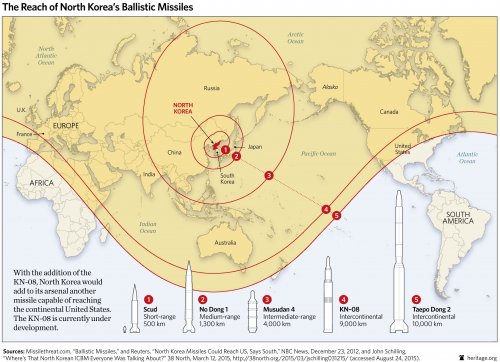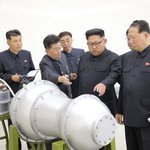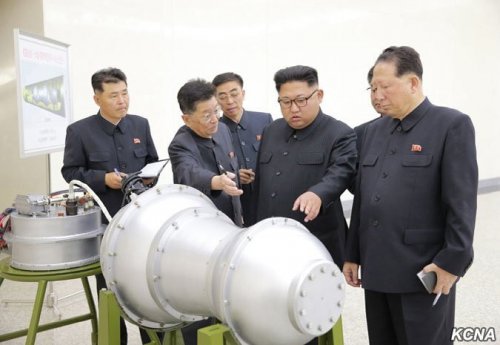- Joined
- 26 January 2011
- Messages
- 2,226
- Reaction score
- 645
Triton said:"Australia’s secret plans to have its own nuclear arsenal"
by Benedict Brook
July 11, 2017
Source:
http://www.news.com.au/technology/science/australias-secret-plans-to-have-its-own-nuclear-arsenal/news-story/2bcac85b0f2cbe3f7e377217d6ef999b
LAST week’s successful test of a North Korean missile raised fresh fears Australia is now potentially within range of one of the rogue nation’s nukes.
Yet despite being the world’s third largest producer of uranium — the key ingredient in a nuclear bomb — Australia has no similar weapon to chuck back should Kim Jong-un press the big red button.
But, were it not for the rolling of Australian Prime Minister John Gorton in 1971, in a Liberal Party coup, Australia could easily have developed its own true blue, and massively deadly, nuke.
A military expert has told news.com.au, that top secret plans were so advanced Australia was considered “top of the pile” of countries expected to acquire its own nuclear arsenal.
It was 60 years ago that the last nuclear bomb was detonated in Australia, a British weapon at the Maralinga test site in South Australia.
If you look closely, evidence of Australia’s plans for its own nuke remain. A few hours south of Sydney, at picturesque Jervis Bay, a small road leads into the bush. By a boat ramp is a large car park.
However, this was never designed to be a place for tourists’ vehicles. Rather, it is the unfinished foundations of Australia’s first commercial nuclear power station.
The public were told it would revolutionise the country’s energy needs. The truth was it would enrich uranium for Australia’s atomic bombs.
The proposed nuclear power station at Jervis Bay would provide electricity — but it’s real purpose was to make the enriched uranium for nuclear bombs.
Associate Professor Wayne Reynolds is a defence and foreign policy expert at the University of Newcastle and author of the book Australia’s Bid for the Atomic Bomb.
He says many are surprised to hear that Australia seriously looked into becoming a nuclear armed state.
“People said it was conspiracy stuff, but it wasn’t — it was the atomic age,” he told news.com.au.
“We wanted to have a navy; in WWII we wanted access to heavy bombers; and so we wanted nuclear weapons. We wanted to maintain a strategic leading edge.”
Australia didn’t want to go it alone. During WWII, British and Australian experts had worked alongside their American counterparts on the Manhattan Project to build the world’s first atomic bomb.
The expectation was that the US would share the results with its allies.
“In 1946, the Americans changed that calculation by announcing they would not share any of the technology or weapons,” says Prof Reynolds. “Britain and Australia were cut out from the club”.
This huge rift in UK-US relations set London on a course that would lead it to test its own weapons 1000 kilometres north west of Adelaide.
“Britain were worried, they knew Russia was developing a bomb and they were desperate to catch up to defend their cities,” he says.
Canberra was also worried. “The thinking was a naval fleet might try and invade. In Sydney and Melbourne we had two big cities that were very vulnerable and if you didn’t have strategic strike capability then you’ve had it.”
Many in the government harboured a desire for a joint “Empire” bomb produced between Australia, Britain, Canada and South Africa.
Despite the UK’s ownership of the bombs it detonated at Maralinga, Canberra hoped aiding Britain might be a step toward its own bomb.
Certainly, no one underestimated Australia’s atom ambitions.
“German, Italy, the Netherlands — all wanted nuclear weapons but Australia was top of the list because of our uranium resources, our scientists and our enrichment program,” Prof Reynolds says.
However, the very success of Britain’s tests only served to isolate Australia further.
In 1957, the US decided it would rather have the UK back in its nuclear club than out on an atomic limb. The US and UK now share their arsenal. “Australia was adrift,” says Prof Reynolds.
So Australia took tentative steps to go it alone. This included the Lucas Heights nuclear plant on Sydney’s southern fringe. Still Australia’s only reactor, it began its life researching, among other things, nuclear weapons.
The Australian Nuclear Science and Technology Organisation (ANSTO), the Government body which now owns Lucas Heights, told news.com.au it is prohibited from conducting any research that could find its way into a future missile.
“ANSTO was created in 1987 by an Act that sets our mandate and specifically outlaws research or development into the design or production of nuclear weapons,” a spokesman said.
“ANSTO’s expertise is geared towards peaceful applications of nuclear technologies.”
In the early 1960s, the Menzies Government was discussing with the US the top secret “SEATO plan 4” which could have seen American bombs on Australian soil.
“This were absolutely not known by the public and plan 4 was only declassified thirty years later,” says Prof Reynolds.
With Communism on the march in Asia, plan 4 detailed Australia’s potential involvement in an atomic response.
“The plans laid out scenarios such as using tactical nuclear weapons in South East Asia. What would be the implications of a nuclear blast on the Kra Isthmus or the impact on the jungle of a high yield device?”
With an almost charming understatement, foreign minister Sir Garfield Barwick told his US counterpart in 1962 that Australia nuking its neighbours, “Was a very serious step … profoundly affecting our future political relations with Asia.”
A year later, China detonated its first nuclear weapon. It boosted the voices of bomb proponents. Who would be next? Japan? India? Indonesia? Could Australia stand by if bombs were pointed at Darwin from Bali?
The Government ramped up its weapons research.
In 1968, ex-RAAF pilot Gorton became Prime Minister. The nuclear non-proliferation treaty (NPT) was already in the works. However, a big supporter of a homegrown nuclear deterrent, Gorton wanted to Australia to be on the “brink of manufacture” of a weapon, says Prof Reynolds.
“If the whole world goes pear shaped, the NPT falls apart and rogue states start shooting weapons, he wanted to know if we [could build this bomb] quickly.”
Gorton gave the green light to Jervis Bay. Work began on the plant which was ostensibly for power generation.
Then, in 1971, Gorton was rolled and the Australian atomic dream died, explained Richard Broinowski of the Australian Institute of International Affairs, in a 2006 paper.
His replacement, Billy McMahon did not support the plans and construction ceased on the plant.
“As Treasurer, [McMahon] had been persuaded by officials that the ‘cover’ devised for the Jervis Bay reactor lacked credibility, since electricity generated there would be double the cost of electricity generated from Australian coal,” Mr Broinowski says.
Gough Whitlam formally ended Australia’s atom ambitions by signing onto the NPT and tying the country’s security to the US.
After decades of stability, the list of nuclear armed nations has increased. India, Pakistan, Israel and, of course, North Korea now possess them.
Prof Reynolds says it is unlikely Australia would seek to host nuclear bombs — its own or others. But history warns you to never say never.
“Historically, we’ve gone with the major powers. But if this unravels we might need a capability down here,” he says.”
“We have the people, the knowledge, the history, the uranium and we still have Lucas Heights.”
Old, old, news. I've known about the nuclear plans for over three decades now. Nothing new or of interest in that report.
Australia in 1970 was about six to twelve months from building a bomb. Today, Australia is about 10-20 years from building a bomb. We lack the industry, the infrastructure and above all else, the nuclear engineers to build and maintain a nuclear arsenal. The people do not support nuclear energy or acquisition of the bomb. :



